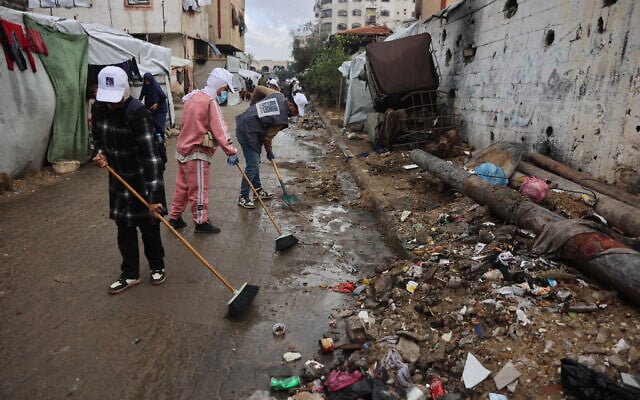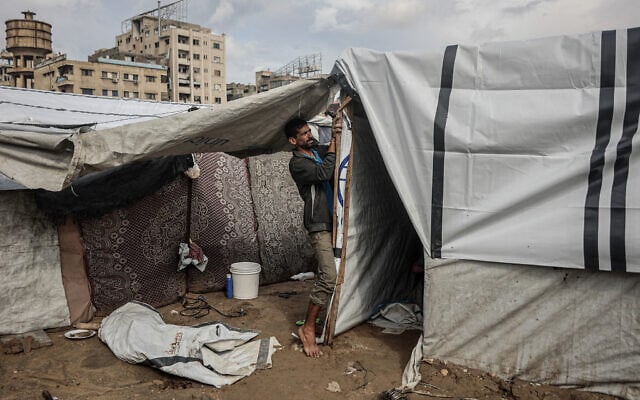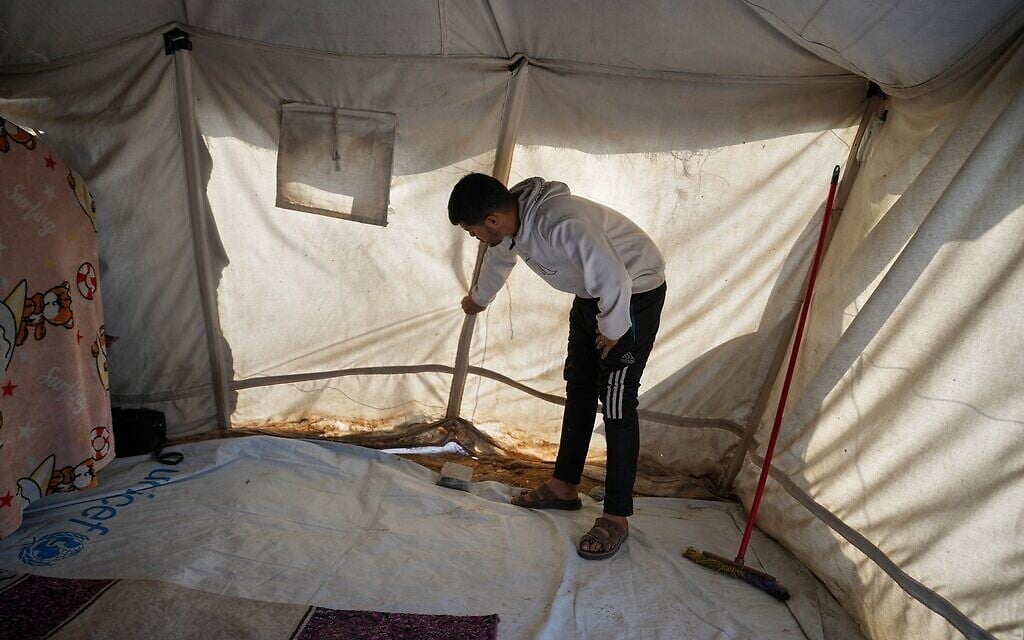DEIR AL-BALAH, Gaza Strip (AP) — Winter’s first heavy rainfall sent water cascading through Gaza’s sprawling Mawasi tent camp on Saturday, as the territory struggles to cope with flooding and devastated infrastructure after two years of war.
Residents attempted to dig trenches to keep the water from flooding their tents, as rain dripped through tears in tarpaulins and makeshift shelters. The intermittent bursts soaked families’ scant belongings. Strong winds can also topple tents and hamper attempts to gather scarce food and supplies.
Two weeks ago, Bassil Naggar bought a new tent on the black market for 2,300 NIS ($712.50), because the summer sun had worn his old tent thin. Still, rainwater was leaking through.
“I spent all [Friday] pushing water out of my tent,” Naggar said, adding that his neighbors’ tents and belongings were wrecked.
“Water puddles are inches high, and there is no proper drainage,” he added.
Get The Times of Israel’s Daily Edition
by email and never miss our top stories
By signing up, you agree to the terms
Barefoot children splashed in puddles as women made tea outside under dark clouds. Some people tried to shelter in destroyed buildings, even those at risk of collapse, with gaping holes covered by pieces of plastic.

People use brooms to sweep a road during, “We Will Rebuild It Again” campaign, organized by the Gaza Municipality in partnership with the Palestinian NGO Network and the Gaza Chamber of Commerce, on November 15, 2025. (Photo by Omar AL-QATTAA / AFP)
According to the United Nations, Mawasi was sheltering up to 425,000 displaced Palestinians earlier this year, the vast majority in makeshift temporary tents, after Israel’s war with Hamas displaced most of Gaza’s population of over 2 million people.
Mawasi had largely been undeveloped sand dunes before the Israeli military designated it a humanitarian zone early in the war.

A Palestinian man fixes his makeshift shelter as the first winter rains fall on a displacement camp in Gaza City on November 14, 2025. (Omar AL-QATTAA / AFP)
COGAT, the Israeli defense body in charge of humanitarian aid in Gaza, has said it is allowing in winterization materials, including blankets and heavy tarps, but aid organizations warn the efforts are far from sufficient when winter temperatures plummet and the wind whips off the Mediterranean.
Times of Israel staff contributed to this report.
Watch DocuNation Season 3: The Heart of Israel
when you join the ToI Community
Support The Times of Israel’s independent journalism and receive access to our documentary series, DocuNation: The Heart of Israel.

In this season of DocuNation, you can stream seven outstanding Israeli documentaries with English subtitles and then join a live online discussion with the filmmakers. The selected films show Israel beyond the conflict: a place of storytellers and musicians, of dreamers, makers, and communities rooted in meaning and trust.
When you watch DocuNation, you’re also supporting Israeli creators at a time when it’s increasingly difficult for them to share their work globally.
To learn more about DocuNation: The Heart of Israel, click here.
Support ToI and get DocuNation
Support ToI and get DocuNation
Already a member? Sign in to stop seeing this
You appreciate our journalism

You clearly find our careful reporting valuable, in a time when facts are often distorted and news coverage often lacks context.
Your support is essential to continue our work. We want to continue delivering the professional journalism you value, even as the demands on our newsroom have grown dramatically since October 7.
So today, please consider joining our reader support group, The Times of Israel Community. For as little as $6 a month you’ll become our partners while enjoying The Times of Israel AD-FREE, as well as accessing exclusive content available only to Times of Israel Community members.
Thank you,
David Horovitz, Founding Editor of The Times of Israel
Already a member? Sign in to stop seeing this
